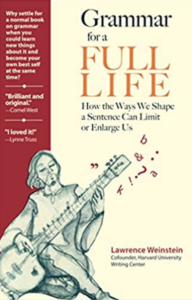Grammar for a Full Life
When I headed off to college as an 18-year-old, I took with me the soft-tongued accent and vernacular of my rural Midwest upbringing. I didn’t exactly stretch single syllable words out into multiple syllables, like those with a southern twang are accused of. But we who’ve been raised among Indiana’s hills and “hollers” let our words bump along for as long as a single syllable can tolerate.
We also “warshed” our hands instead of “washing” them, we cut “pineys” for bouquets in May, not peonies, we used a “sweeper” rather than a vacuum, and when we all brought a covered dish for a community meal, we called it a pitch-in, not a pot-luck. As far as I knew, stepping onto campus for the first time that August, everyone else talked just like me.
I was in for a shock when I met students from all over the country who spoke my same language yet didn’t always understand what I was saying. Not only did they tease me for my accent, but they pronounced my name the wrong way. Their way. My whole life I’d been “Chair-dee,” and suddenly I was “Cha-ri-tee,” with three distinct syllables, a long nasally “a” sound, and soft but distinct t at the end.
I could have claimed my right to speak the way my people had taught me (referring to my family as “my people” is another rural-Indiana-ism, by the way). Instead, I figured “talking like a hick” would somehow hold me back. So I very intentionally changed the way I speak. I started pronouncing oranges like my friend from Boston, with a tall-mouthed “o” as in Oscar. I adopted my Michigan friends’ way of saying “rootbeer,” as if it were spelled “rutbeer.” Sometimes, I even tossed out that Eastern Pennsylvania pronunciation of my own name when I introduced myself: “Hi, I’m Cha-ri-tee.” By changing the way I spoke, I was transformed into another person, not only to those I met, but also to myself.
While the merits of my verbal conversion are debatable, using language as a way to identify ourselves and understand the world around us has been well documented. Scientists like Lera Borodsky, assistant professor of psychology, neuroscience, and symbolic systems at Stanford University, have been studying the way different languages we speak shape the way we think. And not only the way we think. Linguist Benjamin Lee Whorf believed language influences entire cultures, psychologies, and general viewpoints. Then there are the researchers from Yale University and the University of Wisconsin-Madison who found that “verbal stimuli can effectively alter the way we perceive the world, making us see things that aren’t there.”
Inspired by the work of Whorf, Lawrence Weinstein, cofounder of the Harvard University Writing Center, began to wonder if it was more than just the words of language that had this impact on our lives. What about grammar?
“I could not help wondering if certain grammatical moves might have real, transformative value to a speaker/writer who adopts them with volition, wishing to be influenced by them,” Weinstein writes. “For example, if I started handling tenses in a new fashion, that move in itself might have no or little effect on me. If, however, I infused my new management of tenses with purpose—with the wish for some positive effect on myself—what then?”
Weinstein spent more than 15 years noticing the “effects of my grammatical choices on my own quality of life.” From changing his respiratory rate by using the first-person pronouns in his language to actually feeling more energetic when he interspersed the passive voice with the active voice, what he calls a “potent combination.”
In his new book Grammar for a Full Life: How the Ways We Shape a Sentence Can Limit or Enlarge Us, Lawrence Weinstein invites readers into their own journey of well-being through the intentional uses of grammar. Grammar for a Full Life is our next book club selection, and we hope you’ll join us in June for a lively discussion.
Become a Patron to Join This Club
June 2: Grammar to Take Life in Hand plus Grammar for Creative Passivity
June 9: Grammar for Belonging and Grammar for Freedom
June 16: Grammar for Morale, Grammar for Mindfulness, and Grammar for the End
Photo by Rachel Kramer, Creative Commons license via Flickr. Post by Charity Singleton Craig.
- Grammar for a Full Life Book Club: On Becoming Less Possessive - June 16, 2021
- Grammar for a Full Life Book Club: Chilling Out on the Grammar Rules - June 9, 2021
- Grammar for a Full Life Book Club: A Passive Voice - June 2, 2021


Bethany Rohde says
“From changing his respiratory rate by using the first-person pronouns in his language to actually feeling more energetic when he interspersed the passive voice with the active voice, what he calls a ‘potent combination.’” Fascinating, Charity! 🙂